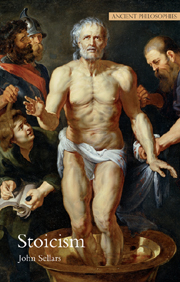6 - The Stoic legacy
Summary
Stoicism persisted as a living philosophical movement in antiquity for some 500 years. Its impact did not end there, however. Ever since the decline of Stoicism some time during the third century CE, Stoic ideas and texts have continued to exert their influence. In what follows I shall offer a brief sketch of the later impact of Stoicism, focusing on the transmission and influence of Stoic texts, along with their impact on later philosophers. I shall not attempt to consider all of the ways in which Stoic ideas have implicitly contributed to later philosophical developments. Rather, I shall focus on explicit engagements with Stoicism or Stoic authors. I shall not comment on the impact of Stoicism on later European literature and culture more generally, although this is an interesting topic in its own right and there has been much written on the subject.
Late antiquity and the Middle Ages
The last Stoic of note, Marcus Aurelius, died in 180 CE. Although there are a few reports of Stoics after that date – the third-century Neoplatonist Porphyry mentions a Stoic in his Life of Plotinus (§17) and the sixth-century Neoplatonist Damascius mentions someone of the “school of Epictetus” in his Philosophical History (46d) – it seems that Stoicism was no longer a vital force. Alexander of Aphrodisias' polemics against Stoicism, written in Athens around 200 CE, suggest that Stoicism remained part of the intellectual scene at that time (Marcus Aurelius had created a chair in Stoicism not long earlier, alongside the chair in Peripatetic philosophy occupied by Alexander), but probably not much later.
- Type
- Chapter
- Information
- Stoicism , pp. 135 - 158Publisher: Acumen PublishingPrint publication year: 2006



